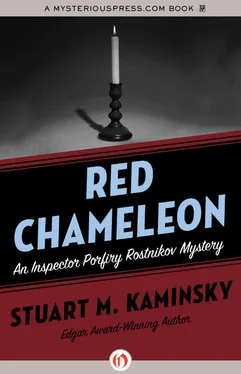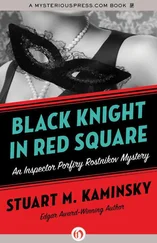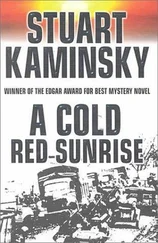Stuart Kaminsky - Red Chameleon
Здесь есть возможность читать онлайн «Stuart Kaminsky - Red Chameleon» весь текст электронной книги совершенно бесплатно (целиком полную версию без сокращений). В некоторых случаях можно слушать аудио, скачать через торрент в формате fb2 и присутствует краткое содержание. Год выпуска: 2012, ISBN: 2012, Издательство: MysteriousPress.com/Open Road, Жанр: Полицейский детектив, на английском языке. Описание произведения, (предисловие) а так же отзывы посетителей доступны на портале библиотеки ЛибКат.
- Название:Red Chameleon
- Автор:
- Издательство:MysteriousPress.com/Open Road
- Жанр:
- Год:2012
- ISBN:978-1-4532-6632-8
- Рейтинг книги:4 / 5. Голосов: 1
-
Избранное:Добавить в избранное
- Отзывы:
-
Ваша оценка:
- 80
- 1
- 2
- 3
- 4
- 5
Red Chameleon: краткое содержание, описание и аннотация
Предлагаем к чтению аннотацию, описание, краткое содержание или предисловие (зависит от того, что написал сам автор книги «Red Chameleon»). Если вы не нашли необходимую информацию о книге — напишите в комментариях, мы постараемся отыскать её.
Red Chameleon — читать онлайн бесплатно полную книгу (весь текст) целиком
Ниже представлен текст книги, разбитый по страницам. Система сохранения места последней прочитанной страницы, позволяет с удобством читать онлайн бесплатно книгу «Red Chameleon», без необходимости каждый раз заново искать на чём Вы остановились. Поставьте закладку, и сможете в любой момент перейти на страницу, на которой закончили чтение.
Интервал:
Закладка:
She tried to look at no one as she rode the subway, not even at the two sailors who talked in the far corner. She stood, swaying slightly with the movement of the car, trying to hold her upright trombone case close to her so no one would feel its weight and sense its shifting contents. At the Kropotkinskaya metro station, groups of young people carrying little bags jostled past her, hurrying toward the huge Moskva Swimming Pool. She let them flow by her and began her walk and her wait, wishing the sky to darken, hoping she could put off taking more of the pills, which, she knew, created a pleasant disorientation that might hamper her aim and shake her resolve.
She walked around the outside wall of the pool, listening to the screams and voices within. At the Kropotkin embankment beyond the pool she leaned over the stone wall and watched the boats going down the Moscow River. She watched for perhaps ten or fifteen minutes, grew restless, felt the pain returning, and started back toward Volkhonka Street. People sped past her now, but she moved across the massive Pushkin Fine Arts Museum. She knew the story of the museum, had visited it frequently, particularly as a child in school when it was thought she had some artistic talent. The building had been erected at the turn of the century. It was, she knew, the largest museum in the Soviet Union outside of the Leningrad Hermitage.
She clutched the trombone case to her, ignoring the looks of guards and visitors. The crowd was large, and she let herself wander, seeing but not absorbing the Greek and Roman collection, the stone statues that would be there long after she was gone. Before she could begin to hate them, she wandered into the picture gallery where she stepped on the foot of a small boy, who screamed.
The boy’s mother looked at Vera, ready to fight, but something in Vera’s face stopped her, and she settled for, “That’s all right, Denis. Some people are blind pigs.”
Vera walked on past Botticellis, Rembrandts, Rubenses, Van Dycks, Constables, Gauguins, Picassos, and Van Goghs. Once they had given her satisfaction. Now they sickened her with their suggestion of timelessness. Vera would leave nothing behind her, no Olympic records, no paintings, her only art of creation one of destruction, a protest.
She had to take more pills. There was no help for it. She shifted the trombone case to her other hand and pulled the bottle out of her pocket. There were not many of the green pills left, perhaps a dozen or so. She would have to go back to the man who had sold them to her, the man who sickened her with his corruption. She placed the case between her legs, poured out some pills, threw them into her mouth, and forced them down dry. It was painful, but the pain in her dry throat distracted her from the pain in her stomach. She stood while people moved about her, the practiced move of Muscovites who watched without making it clear they were doing so. Everyone gave the impression of minding their own business except for a heavyset babushka who walked over and said, “If you’re sick, you shouldn’t be walking the streets. You should be home, not giving diseases to other people.”
Vera looked at the angry old woman, who was saying exactly what her own mother would say to a stranger on the street. Either pretend the other person isn’t there or walk right up to them on the street and chastise them for not sharing your moral commitment.
Vera looked at the woman with vague curiosity. She stared down the old woman, who eventually backed away, shrugging and angry.
The sky was darker when she stepped back outside, and she felt some sense of hope. It was going to rain. No doubt. It would rain. She felt dizzy, slightly dizzy, but also somewhat euphoric as she crossed Kropotkin Square and was almost struck by a bus at the corner of Gogol Boulevard. When she started down Kropotkin Street and passed the entrance to the Soviet Peace Committee Building, the sky rumbled distinctly.
“Let’s hurry,” a man growled at a young woman in high heels who gave him an angry glare as they passed Vera.
The street was filled with people, many people, especially soldiers. There were policemen, too, an ample supply. The trick would be to get to her destination, set up, and pick her target just before the rain came or just after it ended. During the rain people would get off the street. She would have to be clever, precise, careful. She would have to remember everything her father had told her about shooting.
She hurried, as well as her failing body would allow, toward her destination, ignoring the people she passed, thinking only of her task, trying to forget the painting in the museum. It had been by some minor English realist. She couldn’t remember what the subject had been, a landscape surely, but what had been in it? It gnawed at her, told her to turn around, go back, complete it, but she didn’t have the time. Not now. Not today. Perhaps later or tomorrow, if there was a tomorrow. There had to be a later or tomorrow. She could not end her life without knowing what was in that painting and without taking her father’s rifle out one more time and finding the right target.
Even had she not been absorbed in her thoughts, even had she glanced back as the sky rumbled and darkened even further, it is doubtful that she would have noticed the tall, vaguely Oriental, pale man behind her with his right arm in a black sling.
Earlier that morning Emil Karpo had been sitting at his desk at Petrovka going over his file and waiting. He had prepared his description carefully and felt confident that it was more than guesswork. Rostnikov was nowhere to be found, and time was passing. He could have gone directly to the Gray Wolfhound, but he had no time or patience for clowns, and so he prepared his description and took it directly to each of the militia supervisors for each district, making it clear that they were to give it not only to those assigned to the various buildings but to all the police on the street, all the uniformed guards in public buildings, and all the officers who had taken up positions on key rooftops.
Emil Karpo was not a man to be ignored. Seven of his supervisors had simply accepted the description and agreed to pass it out quickly. They had no desire to prolong conversation with the Vampire, the Tatar with the dead brown eyes. It was easier to do what he requested. Besides, they might be the next victim of the Weeper, and it would be best to cooperate. A few of the military supervisors balked or sulked, but eventually they all agreed, and Karpo went back to his desk to drink cold tea and wait. The description had been simple. Look for a man or woman, of recognized size and strength, carrying a case long enough to hold a rifle. It might be a music case, a fishing case, anything. The person would probably be alone and might behave erratically.
By seven in the morning the reports had begun coming in. Karpo listened, believing it was too early in the day for the Weeper to appear but not taking any chances. He had actually dispatched two cars to pursue leads by noon, but they had proved negative. One had turned up a carpenter going to work, another a member of the ballet orchestra. At nine he discovered that the Gray Wolfhound had ordered the rooftop surveillance to begin at six that night, since the Weeper always struck at night. Karpo tried to reach Colonel Snitkonoy to get the surveillance to begin immediately, but the colonel was out. And then the call had come from the guard at the Pushkin Fine Arts Museum, and he was on his way after telling the guard to follow the woman and call her whereabouts back to the museum office where Karpo was heading.
The dispatcher of automobiles was surprised to get a call from Inspector Karpo. He couldn’t remember a single time Karpo had ever ordered a car. The legend was that Karpo thought it a waste of Soviet dollars that could be better spent on real needs. The dispatcher, who felt uneasy even hearing the voice of the Vampire, responded without a word and assigned the driving task to one of the older officers whom he wanted to punish for a minor act of assumed insolence.
Читать дальшеИнтервал:
Закладка:
Похожие книги на «Red Chameleon»
Представляем Вашему вниманию похожие книги на «Red Chameleon» списком для выбора. Мы отобрали схожую по названию и смыслу литературу в надежде предоставить читателям больше вариантов отыскать новые, интересные, ещё непрочитанные произведения.
Обсуждение, отзывы о книге «Red Chameleon» и просто собственные мнения читателей. Оставьте ваши комментарии, напишите, что Вы думаете о произведении, его смысле или главных героях. Укажите что конкретно понравилось, а что нет, и почему Вы так считаете.












